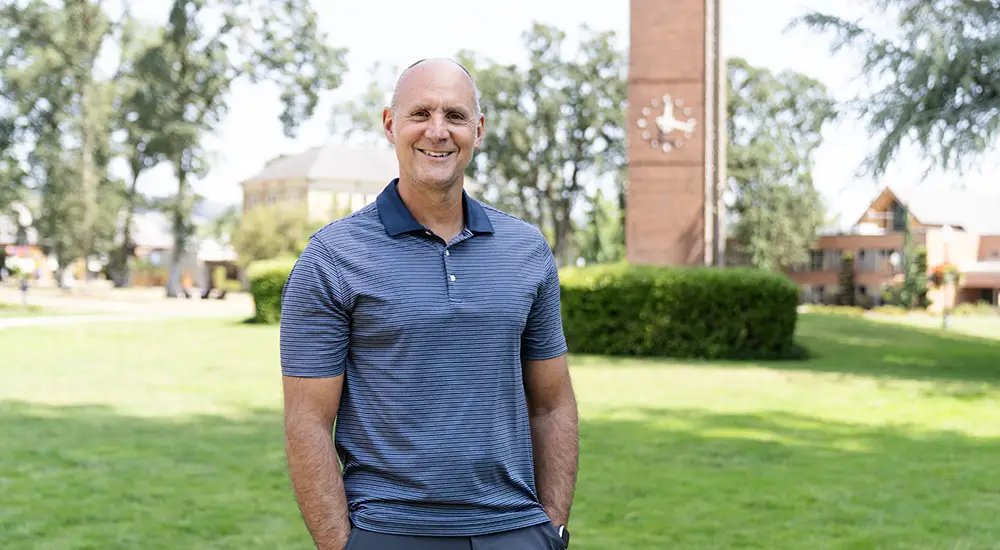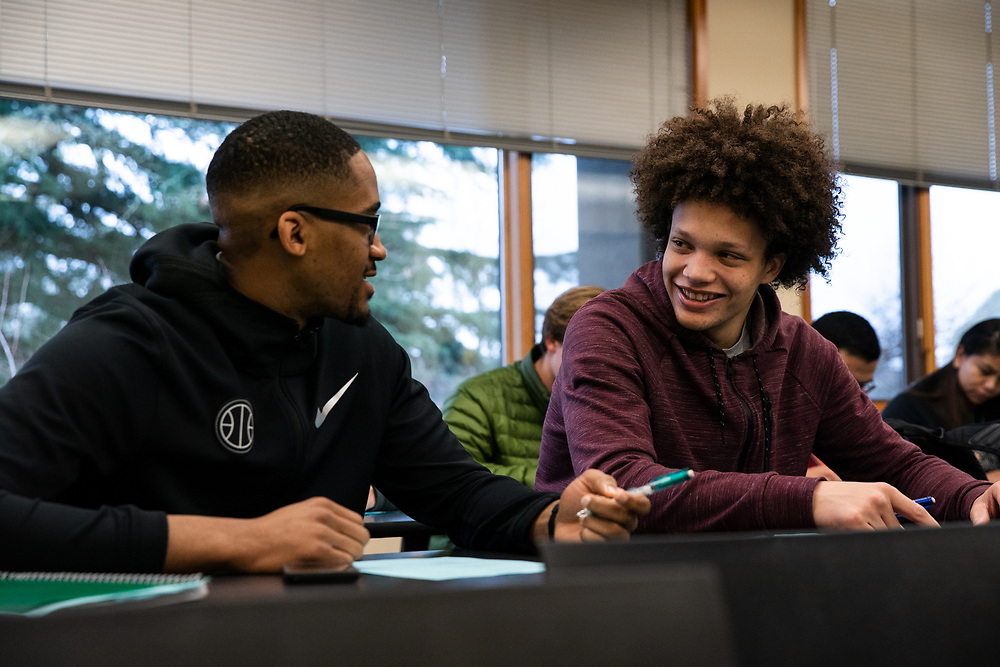
Alumni Spotlight: ClearlyRated’s Nathan Goff on building a top-rated business
by Jeremy Lloyd
So, just what is the “secret sauce” that makes for a successful business venture? According to Nathan Goff, chief technology officer and cofounder at ClearlyRated, named The Oregonian/OregonLive’s Top Workplace in Oregon in 2019, the answer isn’t found by mixing just one or two ingredients.
Rather, the recipe calls for a mix of several factors, including work ethic, a desire to build a better world, privilege and a bit of luck.
Goff, a 2001 George Fox marketing and computer information science alumnus, is happy to share what’s worked for him as a professional. His company, founded in 2003 and headquartered in Portland, is an online platform that helps businesses create client satisfaction surveys and online profiles that highlight reviews and testimonials. The company generated $4 million in revenue in 2019.
As Goff describes it, ClearlyRated aspires “to be to law firms, accounting firms, architects, staffing firms, consulting companies and marketing agencies what Yelp is to restaurants.”
We asked what factors have contributed to ClearlyRated’s success, how George Fox prepared him for the professional world, what advice he’d give current college students seeking to start their own venture, and where he sees his business in the future.
To what do you attribute ClearlyRated’s success?
- 1. A desire to make the world a better place
Both my cofounder [Eric Gregg] and I are driven by a desire to be better both personally and in our business. We get paid to measure how happy clients are with the companies we work with, and being in that business you have to be serious about your own commitment to making people better. That permeates everything we do, from how we approach our benefits to how we service our clients.
This comes through to our clients in how we treat them and generally how we do business. That is pretty infectious and creates a very loyal client base for us, which continues to help us grow as a business. It also creates a lot of loyalty within our employee base and reduces turnover.
- 2. Work ethic
Eric and I were both born to parents who work really hard, and that is true for both of us as well. We have put in a lot of hours and sometimes very grueling hours to get the business to this point. It hasn’t been easy, but without that deep work ethic instilled by our families we would not be here today.
- 3. Privilege
Eric and I have been on a journey, both personally and as an organization, to understand our own privilege and what impact that has, both positive and negative. We are both examples of white male privilege, and I now recognize just how much that impacts our ability to even have a chance at being in the right place at the right time.
This is a very real thing that so many people like us in similar leadership positions are afraid to admit. This saddens me, but is also not a huge shock given that when you start to admit how much that plays a role in your success it’s hard to come to grips with the idea that you didn’t do it all on your own.
I think this is where my Christian upbringing and time at Fox prepared me to be much more open to hearing this message. One of the core themes in the story of Jesus is all about recognizing your own privilege and reaching out to those that don’t have that same privilege and helping lift them up. That is pretty powerful.
- 4. Being in the right place at the right time
The final factor is a whole lot of luck. I can’t discount the fact that we had a good idea at the right time and we happen to have met the right people at that time to make it start to take off. Many very talented people never get that opportunity, and not because they are not good at what they do, but because they didn’t happen to be in the right place at the right time.
Some might say it isn’t luck but some kind of spiritual intervention on your behalf giving you those opportunities. Call it what you will, but without some of whatever it is we don’t get to where we are today.
How did your George Fox experience impact you as a person and as a businessman?
In hindsight, I think Fox taught me the value of building relationships and being mentored by experienced folks that care about you as an individual. I didn’t fully understand how important that was when I was a student, but looking back and comparing my experience to others who went to much larger schools I see how powerful it was to have so much face time with my professors.
I built relationships with people like [former professor] Dirk Barram, who had decades of business experience and lots of wonderful advice to share. That doesn’t happen as often at bigger schools, and I am very grateful to have had that experience.
Despite where I might land theologically and politically today, I do credit my Christian upbringing and my time at Fox for helping me have a h2 compass for doing and fighting for the right thing in my personal and business life.
What are your top three “secrets” to success in launching a successful venture, as you have?
I don’t believe you get to control 70 percent of what makes a business successful, but that last 30 percent you’ve got to work hard to make sure you impact those things as much as possible. That means you need to build a business that cares about the people you employ and serve, then always doing the right thing to both of those groups even if it isn’t always the easy or most profitable thing.
Then you just work as hard as you can. It takes a lot of sacrifice to build something successfully, and that might not be for everyone, but if you want that you have to put in the hours and be really focused on that. With that, though, you have to be willing to try things and fail and then know when to walk away from that failed idea and know when to say no to other new ideas. Those are not easy things to master, but good leaders and businesspeople have figured out how to do those things well.
What would you advise college students to do if they were inclined to start their own business?
Find a really great partner to do it with. I have had several businesses with different partners, and having the right partner where you are really well-aligned is a world-changing experience. You need someone to tell you when your idea sucks or when it is really good. Trying to build a business is extremely hard, and it is a lifesaver to do that with the right person by your side.
I have an incredible relationship with my cofounder, Eric, and when things get hard in the business he always understands at a level that most other people don’t. It makes starting and growing a business a whole lot more fun. On the flip side, though, bad business partners can be awful, so figuring out how to find the right partner is key.
What are your hopes/goals/dreams for ClearlyRated moving forward? Where do you see the company in five to 10 years?
We work with one-third of the largest staffing firms in the world and have collected feedback from over 3.6 million clients and employees of staffing, accounting, legal, and HR services companies. We have made a very real impact on how people are treated in business-to-business industries. We have fundamentally lifted up companies that care about the clients and employees they find jobs for. We have put a spotlight on those firms and helped them grow faster than other firms that don’t treat people nearly as well.
That is the legacy I want ClearlyRated to leave across all business-to-business industries, not just staffing. We are beating the drum of service transparency for business-to-business industries. This already exists for consumer industries with sites like Yelp and Glassdoor, and in five to 10 years I hope I can say that ClearlyRated is to law firms, accounting firms, architects, staffing firms, consulting companies and marketing agencies as Yelp is to restaurants.
People deserve to be treated right and deserve to have a way to understand if the companies they are looking to work with do that, especially in business-to-business, where the financial transactions are very large.
Content goes here.






